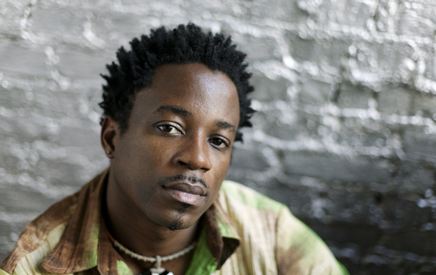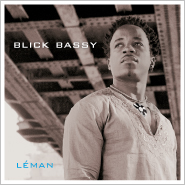
 |
 |
 |
 |
 |
 |
 |
 |
 |
 |

In Stores Now!
FQT-CD-1812

BLICK BASSY is the new soul voice of Cameroon — soul in the sense of vocals that come from within. Bassy says: “The soul of my music isn’t so much in the words, it’s in the way of singing. In fact, the melody almost dictates the words.” On his debut album Léman, the singer / songwriter / guitarist / percussionist connects the music of Central and West Africa and mixes it with bossa nova, jazz and soul. Bassy’s guitar playing is effortlessly intoxicating, his soft voice framed by the kora, calabash and a double bass. The result is a unique, haunting sound which is velvety and subtly harmonic, yet also raw and rhythmic.
Léman was recorded in Salif Keita’s studio in Bamako, Mali, and in Bassy’s current hometown of Paris, and co-produced by Jean Lamoot (known for his work with Souad Massi, Salif Keita, Nneka and Kasse Mady Diabaté) and Jean-Louis Solans. “Léman means ‘mirror’,” explains Bassy. “You cannot lie in front of the mirror. You can also see behind you in a mirror. Léman is about my past, really, and about being African. I see the problems that Africa suffers from and yet I cannot do very much as one person. It’s one of the reasons why I sing in my own language, Bassa, which is one of the 260 Cameroonian languages that fewer and fewer children know how to speak. Every day, African cultures and traditions are lost forever. The song “Africa” talks about these issues but also about the richness of Africa. You can only see all that when you take a little distance. Now that I live in Europe, I see clearly where I’m coming from.”
Blick continues, “Musically it’s interesting to use Bassa. Its specific intonation determines the melody. When I sing in Bassa, I make use of the proverbs in which the Bassa express themselves. They often have a literal sense but also a deeper meaning which you will only understand when you are initiated. For example, in the song “Masse” I talk about ‘the owl that scratched my forehead’ which means you’ve been struck by misfortune. But I’m not nervous singing about these things — I feel I’m well protected by my forefathers!”
Born in 1974, Bassy grew up with 20 siblings in Cameroon’s capital Yaoundé, a city where people from all parts of the country come together, and where the first languages are French and English. “People in Yaoundé lose their traditions and culture rapidly because they don’t speak in their mother tongues with each other or their children,” continues Bassy. “My family is part of the Bassa ethnic group, a nomadic tribe that originally comes from Egypt and has descendents all the way to South Africa. But nowadays people stay in one place because they need visas to cross borders. The word ‘bassy’ means ‘people from the earth’.”
At age 10, Bassy was sent to live with his grandparents for two years in Mintaba, a small village situated in the center of Cameroon. His grandparents initiated Bassy into traditional customs and culture, training him in a variety of tasks, such as hunting, fishing and agriculture. He was also educated in their musical traditions. In Mintaba, daily life is accompanied by music and it was there that Blick discovered the Bolobo (chant for fishing), the Dingoma (chant and percussion for the inauguration of Mbombock chiefs), the Bekele (chant and percussion for weddings), the Hongo (chant for funerals) and the Assiko (guitar percussion, chant and dance). “In Mintaba, people don’t talk much but they sing a lot during their daily tasks. It’s in the singing that they express their emotions and show their souls. My mother used to sing from morning till night. She’s the one who fired my musical aspirations and taught me how to sing. And I was also inspired by singers like Marvin Gaye, Gilberto Gil and Nat King Cole. I realised I wanted to blend the beauty of my Bassa culture and its musical traditions with other music that inspired me and create my own soulful sound.”
Blick Bassy started his first band, Jazz Crew, when he was 17. Playing a fusion of African melodies, jazz and bossa nova, Jazz Crew quickly became the most sought-after group in the city. In 1996, he formed a new band called Macase. During almost 10 fruitful years Macase released two acclaimed albums, Etam (1999) and Doulou (2003), as well as picking up various regional and international awards, including the RFI Prize for World Music (2001), Best Group by MASA (2001), and Best New African Group by the KORA Awards (2003).
In 2005 Bassy decided to leave Macase, moving to Paris where he soon found work with Manu Dibango, Cheikh Tidiane Seck, Lokua Kanza and Etienne Mbappé. A few years later he signed to the World Connection label and began work on his solo debut.
About the album he says: “I’ve been creating and carrying some of these songs around in my head for the past five years. Every detail is a part of me. It feels great to have been able to record them now and share them on stage. The song “Bolo” expresses the sadness that comes with leaving your country and missing it. Lots of Africans have to move away from their hometowns to make a living. I’m the perfect example. But there are benefits to leaving, too. One of my trips took me to Mali and as a result, Malian griot music influenced me in the instrumentation and melodies of this album. So, as with all travelers, I also know that I am growing, and bringing new things to my music.”